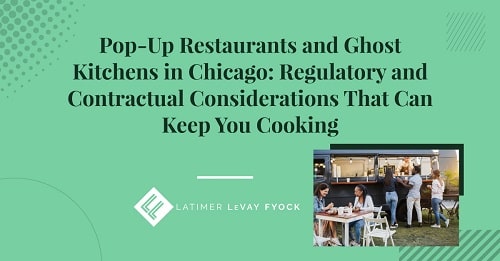Pop-Up Restaurants and Ghost Kitchens in Chicago: Regulatory and Contractual Considerations That Can Keep You Cooking

Few industries have been as disrupted and devastated by the pandemic as the restaurant industry. Conversely, few have responded with as much creativity, innovation, and adaptability as the owners and chefs who have had to find new ways to generate revenue and stay afloat during an unprecedented and ongoing crisis.
While the concepts of “pop-up” restaurants and “ghost kitchens” in Chicago predate the pandemic, they became even more popular as restaurants either shuttered their doors or scaled back their operations. For those who own the facilities that host these temporary endeavors as well as restaurants looking to realize income by inviting others to use their space, pop-ups and ghost kitchens have been a much-needed lifeline.
But just as regular restaurants must comply with multiple licensing and regulatory requirements, so too must the operators and licensors of pop-ups and ghost kitchens. Additionally, the license agreements that allow for the use of kitchen and restaurant space must be carefully tailored to protect each party’s interests and comply with the law.
Chicago’s Pop-Up Initiative
Launched in 2018, Chicago’s Pop-Up Initiative was one of the first programs in the nation to encourage and regulate temporary restaurant operations not tied to a specific location. Those who want to open and operate a pop-up must obtain a pop-up user license from the city. There are three tiers of pop-up restaurant licenses that primarily relate to the kind of food being prepared or sold. The Department of Business Affairs and Consumer Protection (BACP) has a handy fact sheet that outlines the permitted and prohibited activities under each type of Pop-Up Food Establishment User license, as well as the application process and fees involved.
Those who host pop-up restaurants also have obligations and requirements under the city’s regulatory framework, including obtaining licenses of their own. Pop-Up Food Establishment Host licenses are divided into two tiers based on the type of food activity occurring on the premises identified in the license application. You can read more about each type of host license, permitted uses and prohibitions, and other regulatory requirements for pop-up hosts here.
Chicago’s Shared “Ghost” Kitchen Requirements
As with pop-ups, both those who host as well as those who operate shared – or “ghost” - kitchens must obtain their own distinct licenses from the City of Chicago.
Ghost kitchen facility owners are divided into two categories:
- Shared Kitchen (Operator): Any establishment that does not hold a valid retail food establishment license and is used as a place of business for the exclusive or primary purpose of utilizing, leasing, or renting its commercial kitchen space to others for any food-related purposes.
- Shared Kitchen-Supplemental: A licensed retail or wholesale food establishment that leases, rents, or otherwise makes their commercial kitchen space available to others for food-related purposes that are secondary or incidental to the establishment’s primary business activity.
Those who want to use shared kitchen space must obtain one of two types of Shared Kitchen User License:
- Long-Term Shared Kitchen User: Any person who utilizes, leases, or rents kitchen space at any licensed shared kitchen during the applicable two-year license period.
- Short-Term Shared Kitchen User: Any person who utilizes, leases, or rents kitchen space at any licensed shared kitchen for a period not to exceed 90 consecutive calendar days, measured from the date that such short-term user license is issued.
You can read more about ghost kitchen license requirements here.
Agreements Between Owners and Operators of Pop-Ups and Shared Kitchens
As important as the regulatory aspects of pop-ups and shared kitchens, the agreements between owners and users must carefully define the rights, obligations, and liabilities of the respective parties. Since these arrangements are for the “use” of the kitchen and other facilities rather than “occupancy,” standard leases are neither well-suited nor appropriate vehicles for defining the relationship between the parties.
Instead, the owner/lessor of the space and the user should enter into a Temporary License Agreement that allows for use of the space for a finite period. Such license agreements should address the following issues:
- Grant of License: The agreement should be clear that the intention of the parties is not to create a lease or any other interest (possessory or otherwise) in real property, but merely create a revocable, non-exclusive license to use the space for a specific purpose
- Term: The agreement should provide for a specific start and end date that directly relates to the licensee’s User license.
- License Fee: Replacing rent should be a license fee payable to the licensor, which may or may not be a percentage of sales collected by the licensee, along with any audit language in connection with licensor oversight of fee payments
- Cleaning/Damage Fees: Replacing a security deposit would be one or more fees associated with the use of the licensed space by the licensee.
- Permitted Use/Restrictions: Any use language should conform with the license requirements and restrictions, with the license conditioned upon the User/Host having obtained the proper license to operate from the City of Chicago.
If you are an owner/host or potential operator/user of kitchen space in Chicago or a restauranteur looking to cook up some magic in a temporary or shared location, it is important to consult with a knowledgeable attorney who can help keep you out of hot water with the city and with your pop-up or ghost kitchen partner. For assistance with pop-ups and ghost kitchens, please reach out to your Latimer LeVay Fyock contact for assistance.


